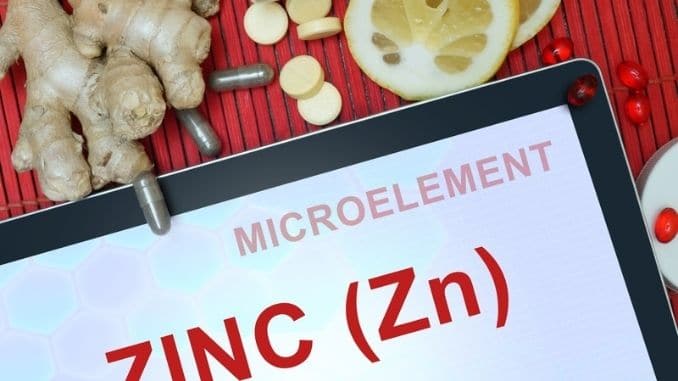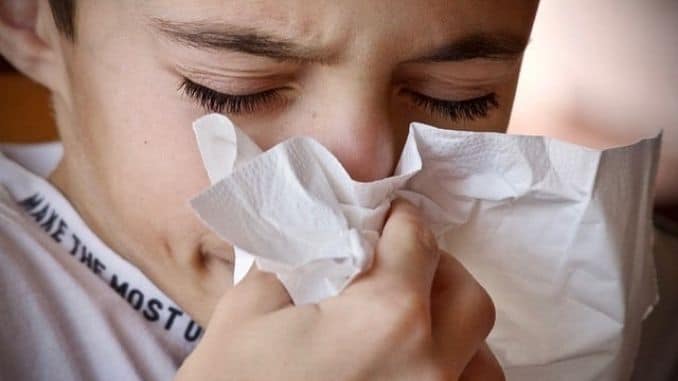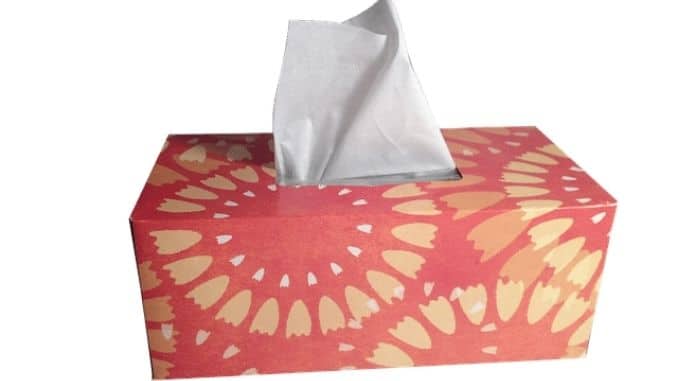
Getting a cold? Here, take some zinc.
It’s advice you’re likely to hear from family, friends and even your doctor during cold and flu season. You may also see advertisements for cold-remedy products like Cold-EEZE and Airborne, both of which boast zinc as one of the main ingredients.
However, why is zinc, over any other nutrient, recommended as the one you need to boost the immune system?
What Is Zinc Anyway?
Zinc is one of the 16 essential minerals we need for good health, along with others like calcium, potassium, and magnesium. The body can’t make its own zinc, so we have to get it from the foods we eat. The recommended dietary allowance (RDA) is 11 milligrams per day (mg/day) for men and 8 mg/day for women. Pregnant and breastfeeding women need more — about 11-12 mg/day.
Although most adults in the United States get enough zinc, older adults can sometimes be deficient. An analysis of data from the National Health and Nutrition Examination Survey (NHANES) showed that 35 to 45 percent of adults aged 60 years or older had zinc intakes below the estimated requirements.
Zinc is involved in many physical functions, including the following:
- Immune function
- Protein synthesis
- Gene expression
- Enzyme activity
- Wound healing
- DNA synthesis
- Cell division
- Breakdown of carbohydrates
- Growth and development
- Taste
- Smell
Although severe zinc deficiency is uncommon in North America, it is present in some areas of the world. It can result in the following health issues:
- Growth retardation
- Loss of appetite
- Impaired immune function
- Hair loss
- Diarrhea
- Delayed sexual maturation
- Impotence
- Hypogonadism
- Eye and skin lesions
- Weight loss
- Delayed healing of wounds
- Taste abnormalities
- Cognitive impairment
Considering that zinc is involved in so many bodily functions, you may wonder why it gains such a large focus when it comes to the immune system.
How Zinc Impacts the Immune System
Zinc is necessary for a healthy immune system. If you’re not getting enough, you may be more vulnerable to the cold and flu and perhaps other diseases as well.
How zinc works within the immune system is complicated, and scientists are still studying it to find out more, but here’s what we know so far. The bottom line is that zinc is involved in many aspects of the immune response ― so many, in fact ― that we haven’t figured them all out yet.
As the researchers noted in a 2009 study, “Zinc deficiency does not affect just a single component of the immune system; the effects are complex, occur on many levels and involve the expression of several hundred genes.”
Zinc Facilitates Communication
Zinc acts as a signaling molecule, taking messages from one cell to another in response to external stimulation. There seems to be “crosstalk” that happens between zinc and immune-related signaling guides that affect the normal development and function of immune cells.
Zinc may tell the immune system to create more killer cells, for example, to kill off invaders like viruses and bacteria. It may also be involved in telling immune cells where to go to do their work.
Zinc Is Essential for Enzyme Activity
Enzymes are special types of proteins that help catalyze (cause) or speed up chemical reactions in the body. They get things started, so to speak, and each enzyme is responsible for only one type of reaction, so we have many different enzymes in the body to get various reactions going.
Zinc is known to be an essential factor for the activity of many enzymes involved in immune function. These enzymes can’t function without zinc, which means that many reactions involved in the immune system response would never get started without enough zinc.
Zinc Is Needed for the Development of Immune Cells
The immune system has several different types of cells working to protect you from illness and disease. There are B cells, T cells, lymphocytes and more, and most of them require zinc for development. Without enough zinc, you won’t have enough of these cells because the body won’t be able to produce them. It would be like not having enough soldiers in your army to fight a battle.
Scientists have found that when a person is deficient in zinc, he or she is also likely to have low levels of these critical immune cells. One study found that just 30 days of suboptimal zinc intake could lead to a 30 to 80 percent loss in defense capacity.
Zinc Helps Regulate Inflammation
Inflammation is a key part of immunity. When the body senses an injury or invasion, it rushes immune cells to the site to kill off any bacteria, viruses, fungi or other illness-causing bad guys. While it’s doing that, inflammation — swelling, warmth and redness — occurs.
Zinc helps regulate that inflammation, increasing the production of cells that promote inflammation when needed so that the body mounts a strong defense. Some studies also indicate that it may be involved in reducing inflammation when the job is done.
In a 2013 study, for example, researchers discovered that zinc helps control infections by tapping the brakes on the immune response in a way that prevents out-of-control inflammation. It keeps the immune response balanced so that there is enough to stop the infection, but not so much that inflammation causes damage.
“We want a robust inflammatory response,” said lead author Daren Knoell, “which is part of our natural programming to defend us against a bug. But if that is unchecked, and there is too much inflammation, then it not only attacks the pathogen but can also cause much more collateral damage.”
This role that zinc plays in inflammation is so critical that some researchers believe that having a zinc deficiency could put people at greater risk of cardiovascular disease, cancer, and diabetes — all diseases that involve excess inflammation.
Zinc Limits Oxidative Stress
The body is constantly guarding against “oxidative stress,” which is cellular damage caused by free radicals or “reactive oxygen species (ROS).” These free radicals are produced by our own metabolism, and we are also exposed to them from the outside world.
In a 2015 study, researchers found that oxidative stress limited the immune system’s ability to protect from illnesses. With more antioxidants, however, which neutralize free radicals, the immune system rebounded and performed well again.
Zinc is a natural antioxidant, which means in addition to all its other functions, it can neutralize free radicals, protecting the immune system so that it can continue to work as it should.
Can Someone Get Too Much Zinc?
At high levels, zinc can be harmful. Signs that you’re getting too much include:
- Nausea
- Vomiting
- Loss of appetite
- Stomach cramps
- Diarrhea
- Headaches
If a person gets too much zinc over a long period, complications may include lowered immunity, low copper levels and low levels of HDL “good” cholesterol.
The upper limit for zinc is 40 mg/day. More than that is not recommended.
Zinc can also interact with some medicines, including antibiotics and diuretics, affecting how much of the drug is absorbed, so talk to your doctor before taking supplements.
Who’s at Risk for a Zinc Deficiency?
Although most people in the U.S. get enough zinc from the foods they eat, certain groups are at risk for not getting enough:
- Vegetarians: They do not eat meat, which is a good source of zinc. They also tend to eat a lot of beans and grains, and these have compounds that can interfere with zinc absorption.
- People with digestive disorders: Ulcerative colitis and Crohn’s disease can interfere with the absorption of zinc. People who have had weight-loss gastrointestinal surgery may also be at risk.
- Alcoholics: Because alcoholic beverages decrease the amount of zinc the body absorbs.
- Poor diet: Eating a poor diet may also rob you of the foods you need to get enough zinc.
Does Zinc Help Shorten a Cold?
A recent analysis of several studies showed that zinc lozenges or syrup did reduce the length of a cold by one day, especially when taken within 24 hours of the first signs and symptoms of a cold. The lozenge or syrup forms may be more effective because they keep the zinc in the throat, where it is more likely to come into contact with the virus, causing the cold.
Other research has shown even more positive results, with the lozenges in particular potentially shortening a cold by nearly three days. There are fewer studies on zinc and the flu. There is evidence that supplemental zinc can help the elderly to fend off disease better since they are often deficient in the mineral.
The Mayo Clinic does caution against using zinc sprays as they can negatively affect taste and smell and may cause permanent damage. The U.S. Food and Drug Administration (FDA) warned in 2009 that zinc-containing nasal sprays had been linked to more than 100 cases of loss of smell.
Good Food Sources of Zinc
Although you can get zinc from supplements, it’s usually best to get it from food. Below are some of the best food sources of zinc:
- Oysters
- Red meat like beef and lamb
- Poultry
- Pork
- Shellfish like crab, shrimp, mussels, and lobster
- Mushrooms
- Seeds like sesame, pumpkin, and hemp
- Lentils
- Beans
- Nuts like cashews
- Yogurt
- Oatmeal
For the best foods to help heal your body, make sure to check out The Best Foods that Rapidly Slim & Heal in 7 Days, here!
.







